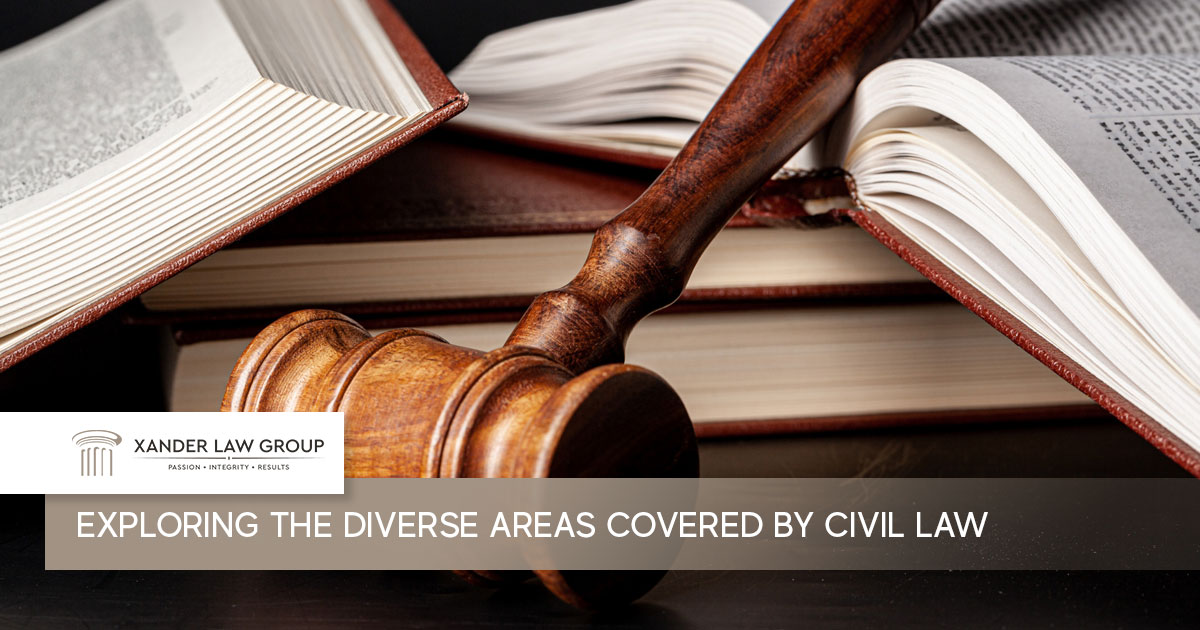Exploring The Diverse Areas Covered By Civil Law
Many people understand the legal world through the lens of television shows and courtroom dramas. However, these theatrical productions are not helpful when there is a real need for legal guidance. If you need legal services or expertise, an experienced Miami civil lawyer could be the solution.
Civil law encompasses several areas that directly impact the lives of everyday citizens, from protecting your rights and property to ensuring fair resolution in disputes.
What Is Civil Law?
Civil law is an umbrella term that describes a comprehensive and well-organized legislative system of rules and principles from Roman law. It governs private disputes between individuals and organizations and often involves issues stemming from contract and property disagreements, family matters, and civil wrongdoings.
The primary goal of civil law is to resolve conflicts and find agreeable resolutions, such as monetary compensation. In this way, civil law differs from criminal law, which addresses offenses committed against society and seeks to punish individuals through fines, probation, and imprisonment.
The Main Areas Of Civil Law
There are many different areas of civil law, ranging from family law to labor law and immigration. As a team of experienced Miami civil lawyers, we’ve put together the most common areas and the role that they play in everyday life.

Family Law
Family law covers all family-related and domestic legal issues, aiming to resolve disputes within the family unit while protecting those involved.
Common areas under family law include:
- Marriage and divorce, including annulment and separation
- Child custody and visitation rights of parents
- Alimony and spousal support
- Domestic violence and securing protective orders
- Prenuptial and postnuptial agreements
- Paternity and maternity to establish parentage
- Adoption and surrogacy
- Property division in the instance of divorce or separation
Many of these issues involve complex emotions and trigger emotional responses. An experienced civil lawyer strives to meet amicable resolutions to help prevent unnecessary tension and pain.
Tort Law
Tort law is one of the most common civil suits, describing most claims arising in civil court aside from contractual disputes. Essentially, tort law addresses negligence, intentional harm, and strict liability.
With a strong focus on restorative justice, tort law aims to address losses and injuries by instructing the defendant to pay financial compensation to the victim.
For example, a texting driver may hit and injure a pedestrian crossing at a designated crosswalk. The pedestrian could sue the driver for negligence and be compensated for the injuries. In another example, an individual who posts false statements about another on social media could face defamation charges and be ordered to pay monetary compensation for reputational damage.

Property Law
Property ownership is a foundational right, and property law establishes the legal rights and obligations concerning one’s property. Property law can be divided into two main categories: tangible and intangible.
Tangible property includes personal belongings, vehicles, and real estate, while intangible property includes investments, bank accounts, and copyrights. Property law covers the ownership, title and deeds, and transfer of all tangible and intangible property, playing an important role in facilitating economic transactions and protecting the rights of those involved.
Contract Law
Contract law helps commercial transactions by protecting the rights and interests of all parties involved. Understanding contract law is essential for businesses, ensuring that the agreement between two parties is legally valid.
Contract law should be considered whenever forming a viable contract, ensuring that terms and conditions are specified and key factors are outlined in the documentation.
For example, terms and conditions, performance and breaches of contract, interpretation of unclear terms, and termination clauses are all key considerations. Contract law also ensures that the agreement is not voidable.
Company Law
Company law is another civil law focus associated with commercial operations, ensuring accountability, protection of interests, and legal economic development. Also known as corporate law, company law is a specialized legal practice that provides a framework for businesses, ensuring that the rights, relations, and conduct of persons and organizations are upheld in the following situations:
- Incorporation and formation of business entities
- Internal governance and management
- Outlining shareholder rights and duties
- Imposing fiduciary duties on directors and officers
- Governance of the issuance, sale, and trading of securities
- Maintaining corporate compliance and ethics
- Corporate litigation and dispute resolution

Civil Rights Law
Civil rights law advocates for the individual and provides legal protections against government abuse or discrimination, ensuring that all individuals are guaranteed full and equal citizenship.
The area of law covers a range of civil rights, such as freedom of speech, freedom of religion, the right to vote, and equal protection under the law. These rights are key to maintaining a just and fair democratic society, and a civil rights lawyer ensures these rights are upheld.
The key objectives of civil rights law are to promote equality, prevent discrimination, ensure access to justice, build inclusive communities, and improve social justice so that citizens can live with dignity and live without oppression.
Immigration Law
Immigration law is a specialized branch of law that regulates international migration, protects national security, and upholds humanitarian principles.
Immigration law covers several aspects, including visa and entry requirements, legal status and residence, and employment and work authorization. Immigration lawyers also have experience in family-based immigration, deportation, and asylum.
Labor Law
Labor law is a framework for the rights and responsibilities of employers, employees, trade unions, and government agencies involved in the workplace.
Labor law includes a set of guidelines, practices, and regulations that ensure fair practice and protect employees and employers. These include fair wages, safe working conditions, and respect for workers’ rights.
Depending on the case, labor experts could cover employment contracts, workplace safety, equal employment opportunity, and employee termination.
The Benefits Of A Civil Lawyer
Dealing with a civil case can be challenging as you navigate complicated legal situations and principles — and that’s where a Miami civil lawyer can be helpful.
Hiring an expert in civil law offers the following benefits:
- Specialized knowledge in civil law matters to navigate the issues effectively
- Develop a legal strategy for the best chance of a successful outcome
- Professional representation of your case throughout negotiations and court proceedings
- Expert legal advice to help you navigate your rights and options
- Reduce the stress of handling legal matters on your own
- Save costs in the long run

Hire A Professional Miami Civil Lawyer
If you’re looking for someone to represent you in civil litigation, call our passionate team at +1-305-767-2001. We aggressively defend our client’s interests and rights in specific civil cases, from breach of contract and settlement agreements to personal injuries and business torts.









